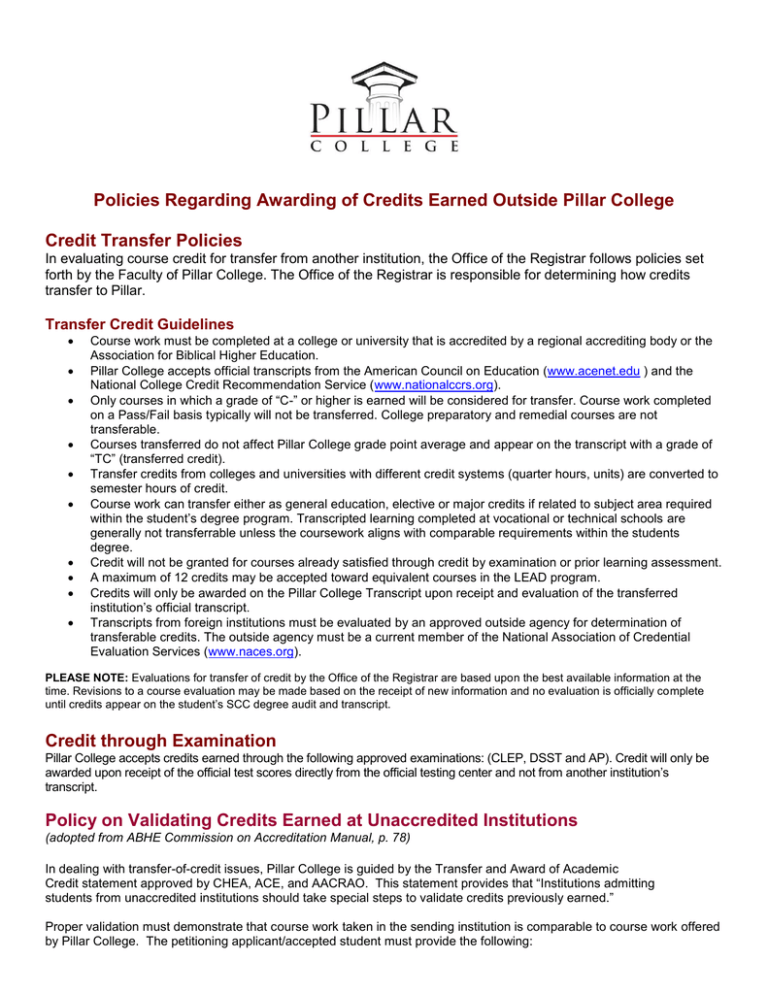Policies Regarding Awarding of Credits Earned Outside Pillar
advertisement

Policies Regarding Awarding of Credits Earned Outside Pillar College Credit Transfer Policies In evaluating course credit for transfer from another institution, the Office of the Registrar follows policies set forth by the Faculty of Pillar College. The Office of the Registrar is responsible for determining how credits transfer to Pillar. Transfer Credit Guidelines Course work must be completed at a college or university that is accredited by a regional accrediting body or the Association for Biblical Higher Education. Pillar College accepts official transcripts from the American Council on Education (www.acenet.edu ) and the National College Credit Recommendation Service (www.nationalccrs.org). Only courses in which a grade of “C-” or higher is earned will be considered for transfer. Course work completed on a Pass/Fail basis typically will not be transferred. College preparatory and remedial courses are not transferable. Courses transferred do not affect Pillar College grade point average and appear on the transcript with a grade of “TC” (transferred credit). Transfer credits from colleges and universities with different credit systems (quarter hours, units) are converted to semester hours of credit. Course work can transfer either as general education, elective or major credits if related to subject area required within the student’s degree program. Transcripted learning completed at vocational or technical schools are generally not transferrable unless the coursework aligns with comparable requirements within the students degree. Credit will not be granted for courses already satisfied through credit by examination or prior learning assessment. A maximum of 12 credits may be accepted toward equivalent courses in the LEAD program. Credits will only be awarded on the Pillar College Transcript upon receipt and evaluation of the transferred institution’s official transcript. Transcripts from foreign institutions must be evaluated by an approved outside agency for determination of transferable credits. The outside agency must be a current member of the National Association of Credential Evaluation Services (www.naces.org). PLEASE NOTE: Evaluations for transfer of credit by the Office of the Registrar are based upon the best available information at the time. Revisions to a course evaluation may be made based on the receipt of new information and no evaluation is officially complete until credits appear on the student’s SCC degree audit and transcript. Credit through Examination Pillar College accepts credits earned through the following approved examinations: (CLEP, DSST and AP). Credit will only be awarded upon receipt of the official test scores directly from the official testing center and not from another institution’s transcript. Policy on Validating Credits Earned at Unaccredited Institutions (adopted from ABHE Commission on Accreditation Manual, p. 78) In dealing with transfer-of-credit issues, Pillar College is guided by the Transfer and Award of Academic Credit statement approved by CHEA, ACE, and AACRAO. This statement provides that “Institutions admitting students from unaccredited institutions should take special steps to validate credits previously earned.” Proper validation must demonstrate that course work taken in the sending institution is comparable to course work offered by Pillar College. The petitioning applicant/accepted student must provide the following: 1. Official Transcript (outlining definition of credit hour and grading key) 2. Institutional Catalog verifying a) Admissions process whereby entrance requirements include high school completion (or GED), faculty with appropriate graduate degree credentials from regionally accredited or CHEA recognized accreditation agencies, and grading standards. 3. Official documentation from the sending institution of acceptance of credit at other regionally accredited institutions. 4. If necessary, Pillar College academic administration may require the applicant/student or sending institution to provide syllabi of courses petitioned for transfer for further validation of comparable academic rigor. Pillar College shall retain documentation in the student’s permanent file outlining the process used to validate credits accepted from unaccredited sending institutions. This documentation shall serve as the basis for self study of institutional practices relative to validation of transfer credits from unaccredited institutions. Assessment of Prior Learning Pillar College follows guidelines established by The Council for Adult and Experiential Learning (CAEL) for evaluating a student’s non-credited learning which takes place outside the traditional college classroom. Students may apply for academic credit for non-credited learning via a portfolio process. The portfolio is a collection of narratives and documentation which demonstrates how a student’s experiential learning is comparable to college-level learning. Sources of learning may include professional workshops, seminars, self-study, non-credit classes, training programs, vocational certificate programs and life/work and military experiences. LEAD students are encouraged to make an appointment to meet with the LEAD Office about potential eligibility of credit for prior learning that can be applied towards graduation. See Tuition and Fees section of the catalog for charges.

